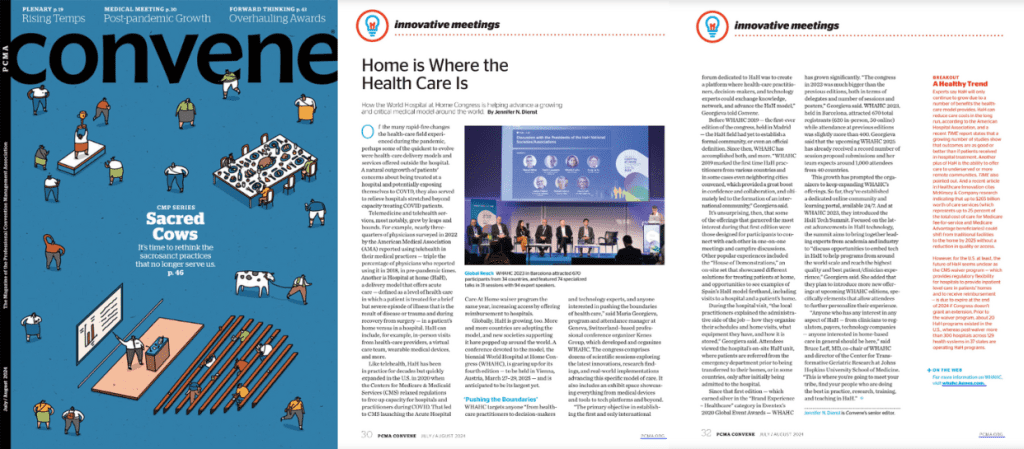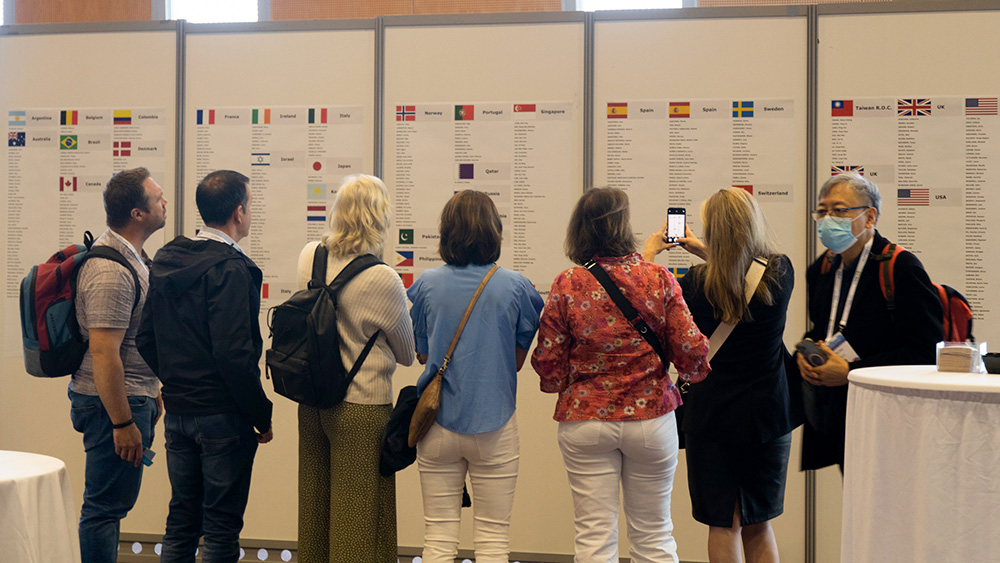
The World Hospital at Home Congress is helping advance the growing and critical service of bringing healthcare to people’s homes around the world.

WHAHC 2023 in Barcelona featured 74 specialized talks in 31 sessions with 94 expert speakers.
Of the many rapid-fire changes the health-care field experienced during the pandemic, perhaps some of the quickest to evolve were health-care delivery models and services offered outside the hospital. A natural outgrowth of patients’ concerns about being treated at a hospital and potentially exposing themselves to COVID, they also served to relieve hospitals stretched beyond capacity treating COVID patients.
Telemedicine and telehealth services, most notably, grew by leaps and bounds. For example, nearly three-quarters of physicians surveyed in 2022 by the American Medical Association (AMA) reported using telehealth in their medical practices — triple the percentage of physicians who reported using it in 2018, in pre-pandemic times. Another is Hospital at home (HaH), a delivery model that offers acute care — defined as a level of health care in which a patient is treated for a brief but severe episode of illness that is the result of disease or trauma and during recovery from surgery — in a patient’s home versus in a hospital. HaH can include, for example, in-person visits from health-care providers, a virtual care team, wearable medical devices, and more.
Like telehealth, HaH has been in practice for decades but quickly expanded in the U.S. in 2020 when the Centers for Medicare & Medicaid Services (CMS) relaxed regulations to free up capacity for hospitals and practitioners during COVID. That led to CMS launching the Acute Hospital Care At Home waiver program the same year, increasing access by offering reimbursement to hospitals.
Globally, HaH is growing, too. More and more countries are adopting the model, and new societies supporting it have popped up around the world. A conference devoted to the model, the biennial World Hospital at Home Congress (WHAHC), is gearing up for its fourth edition — to be held in Vienna, Austria, March 27–29, 2025 — and is anticipated to be its largest yet.

The World Hospital at Home Congress 2023 attracted 670 participants from 34 countries.
‘Pushing the Boundaries’
WHAHC targets anyone “from health-care practitioners to decision-makers and technology experts, and anyone interested in pushing the boundaries of health care,” said Maria Georgieva, program and attendance manager at Geneva, Switzerland–based professional conference organizer Kenes Group, which developed and organizes WHAHC. The congress comprises dozens of scientific sessions exploring the latest innovations, research findings, and real-world implementations advancing this specific model of care. It also includes an exhibit space showcasing everything from medical devices and tools to tech platforms and beyond.
“The primary objective in establishing the first and only international forum dedicated to HaH was to create a platform where health-care practitioners, decision-makers, and technology experts could exchange knowledge, network, and advance the HaH model,” Georgieva told Convene.
Before WHAHC 2019 — the first-ever edition of the congress, held in Madrid — the HaH field had yet to establish a formal community, or even an official definition. Since then, WHAHC has accomplished both, and more. “WHAHC 2019 marked the first time HaH practitioners from various countries and in some cases even neighboring cities convened, which provided a great boost in confidence and collaboration, and ultimately led to the formation of an international community,” Georgieva said.
It’s unsurprising, then, that some of the offerings that garnered the most interest during that first edition were those designed for participants to connect with each other in one-on-one meetings and campfire discussions. Other popular experiences included the “House of Demonstrations,” an on-site set that showcased different solutions for treating patients at home, and opportunities to see examples of Spain’s HaH model firsthand, including visits to a hospital and a patient’s home.
During the hospital visit, “the local practitioners explained the administrative side of the job — how they organize their schedules and home visits, what equipment they have, and how it is stored,” Georgieva said. Attendees viewed the hospital’s on-site HaH unit, where patients are referred from the emergency department prior to being transferred to their homes, or in some countries, only after initially being admitted to the hospital.
Since that first edition — which earned silver in the “Brand Experience – Healthcare” category in Eventex’s 2020 Global Event Awards — WHAHC has grown significantly. “The congress in 2023 was much bigger than the previous editions, both in terms of delegates and number of sessions and posters,” Georgieva said. WHAHC 2023, held in Barcelona, attracted 670 total registrants (620 in-person, 50 online) while attendance at previous editions was slightly more than 400. Georgieva said that the upcoming WHAHC 2025 has already received a record number of session proposal submissions and her team expects around 1,000 attendees from 40 countries.
This growth has prompted the organizers to keep expanding WHAHC’s offerings. So far, they’ve established a dedicated online community and learning portal, available 24/7. And at WHAHC 2023, they introduced the HaH Tech Summit. Focused on the latest advancements in HaH technology, the summit aims to bring together leading experts from academia and industry to “discuss opportunities to embed tech in HaH to help programs from around the world scale and reach the highest quality and best patient/clinician experience,” Georgieva said. She added that they plan to introduce more new offerings at upcoming WHAHC editions, specifically elements that allow attendees to further personalize their experience.
“Anyone who has any interest in any aspect of HaH — from clinicians to regulators, payers, technology companies — anyone interested in home-based care in general should be here,” said Bruce Leff, MD, co-chair of WHAHC and director of the Center for Transformative Geriatric Research at Johns Hopkins University School of Medicine. “This is where you’re going to meet your tribe, find your people who are doing the best in practice, research, training, and teaching in HaH.”
A Healthy Trend
Experts say HaH will only continue to grow due to a number of benefits the health-care model provides. HaH can reduce care costs in the long
run, according to the American Hospital Association, and a recent TIME report states that a growing number of studies show that outcomes are as good or better than if patients received in-hospital treatment. Another plus of HaH is the ability to offer care to underserved or more remote communities, TIME also pointed out. And a recent article in Healthcare Innovation cites McKinsey & Company research indicating that up to $265 billion worth of care services (which represents up to 25 percent of the total cost of care for Medicare fee-for-service and Medicare Advantage beneficiaries) could shift from traditional facilities to the home by 2025 without a reduction in quality or access.
However, for the U.S. at least, the future of HaH seems unclear as the CMS waiver program — which provides regulatory flexibility for hospitals to provide inpatient level care in patients’ homes and to receive reimbursement — is due to expire at the end of 2024 if Congress doesn’t grant an extension. Prior to the waiver program, about 20 HaH programs existed in the U.S., whereas post-waiver more than 300 hospitals across 129 health systems in 37 states are operating HaH programs.
ON THE WEB
For more information on WHAHC, visit whahc.kenes.com.
This article was originally published in the July/August 2024 issue of the PCMA Convene Magazine – Innovative Meetings (page 30, 32): https://bit.ly/4dD3BxH